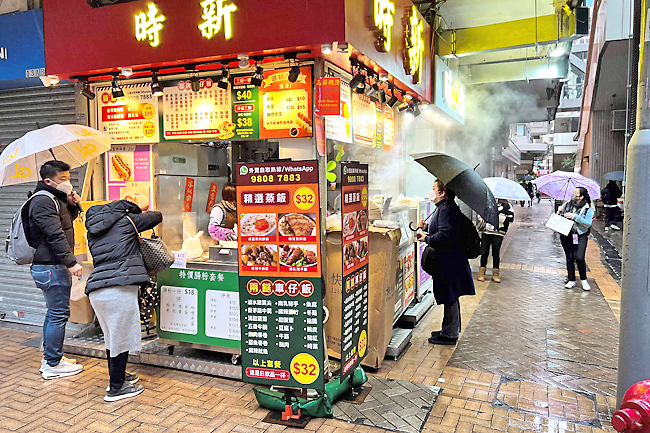HONG KONG (CNA) – Hong Kong restaurant Pasta Zone lost its evening crowd in early January, when authorities imposed a 6pm curfew on dining to help curb COVID-19. A few weeks later, when the government asked people to work from home, the lunch crowd evaporated as well.
That reduced business by two-thirds, co-owner Yvonne Chan said, adding that the restaurant could probably survive for six months in such conditions.
Health authorities said such restrictions will remain in place for 16 types of businesses, including restaurants such as Chan’s, or even tighten, until the government reaches its stated “dynamic zero-COVID” goal of eradicating any outbreak.
“We don’t know what to do. Our hands are tied,” Chan said.
Without unprecedented relief measures in Hong Kong’s 2022-23 budget tomorrow, it’s hard to see how the economy can avoid contracting again after emerging last year out of its most prolonged recession, which lasted from 2019 to 2020, economists said.
The government has pledged support beyond the latest round of subsidies worth USD3.46 billion announced this year, but has not flagged any specific measures for the upcoming budget.

The finance and commerce departments did not immediately reply to requests for comment.
In his regular Sunday blog post, Finance Secretary Paul Chan said the government needs to “do its best” to offer financial support to people and small and medium-sized companies, and restore confidence.
The Hong Kong General Chamber of Commerce said bold budget measures were needed to “avoid company closures.”
Its proposals included aid for employees and small businesses in affected industries; consumption voucher handouts to residents; and one-off 100 per cent cuts in profit, salary and income taxes, capped at USD2,564.
The current restrictions, which have seen bars, gyms, beauty parlours and a dozen other types of venues close, and most people working from home, are tighter than in 2020.
The current outbreak, the fifth and largest Hong Kong has experienced, is expected to worsen, potentially reaching up to 30,000 infections a day by the end of March from 7,000 or so now, some epidemiologists said.
This week’s introduction of vaccine passes is unlikely to make people eager to hit the shops, economists said, as contact tracing could lead to hours queuing for testing and infections could result in weeks in quarantine facilities, regardless of symptoms.
“This fifth wave looks set to bring the city back to a recession,” Daiwa Capital Markets analysts wrote in a note last week.
Hong Kong leader Carrie Lam said last week it would take two or three months to bring COVID-19 under control.
Many businesses said they may not have that much time.
Head of the Licensed Bar and Club Association of Hong Kong Ben Leung told Reuters 20 per cent to 30 per cent of bars would not survive past April without help or a relaxation of restrictions.
A legislator representing the restaurant and catering industry Tommy Cheung told Reuters some restaurants would close unless the environment improves in March.
“The situation is getting worse by the day,” Cheung said.





